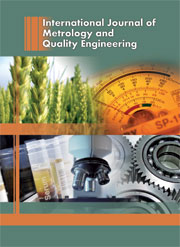Article contents
Developing a lean measurement system to enhance processimprovement
Published online by Cambridge University Press: 06 March 2014
Abstract
A key ingredient to underpin process improvement is a robust, reliable, repeatablemeasurement system. Process improvement activity needs to be supported by accurate andprecise data because effective decision making, within process improvement activity,demands the use of “hard” data. One of the oldest and most established process improvementmethods is Deming’s Plan-Do-Check-Act (PDCA) cycle which is reliant on the check phase, ameasurement activity where data is being gathered and evaluated. Recent expansions of thePDCA such as the Six-Sigma Define-Measure-Analyse-Improve-Control (DMAIC) methodologyplace significant importance upon measurement. The DMAIC cycle incorporates the regimentedrequirement for the inclusion of measurement system analysis (MSA) into the breakthroughstrategy. The call for MSA within the DMAIC cycle is to provide the improvement activitywith a robust measurement system that will ensure a pertinent level of data during anyvalidation process. The Lean methodology is heavily centred on the removal of the sevenMudas (wastes) from a manufacturing process: defects, overproduction, transportation,waiting, inventory, motion and processing. The application of lean, particularly withinthe manufacturing industry, has led to a perception that measurement is a waste within amanufacturing process because measurement processes identify defective products. Themetrologists’ pursuit for measurement excellence could be construed as a hindrance by the“cost down” demands being perpetrated from the same organisation’s lean policy. So whatpossible benefits does enforcing the regimes of the lean and quality philosophies upon themeasurement process have and how does this ultimately enhance the process improvementactivity? The key fundamental to embed with any process improvement is the removal ofwaste. The process improvement techniques embedded within lean and quality concepts areextremely powerful practices in the drive to eradicate waste but there are numerouscontextual problems with the application of the process improvement activity and itsassociated measurement system. The application demands of the organisation may bedependent on a number of financial and resource constraints which may introduce reasonsnot to apply stringent measurement methodology and practice. The failure of variousprocess improvement activities due to poorly managed measurement activity has arguablynever been comprehensively analysed. Process improvement activity theory fully embellishesthe need for applied robust measurement systems, so how can process improvement andmeasurement be systematically aligned to gain benefits? The aim of this paper is toconsider whether lean philosophies can be integrated and applied within measurementsystems. The discussion seeks to identify if seven Muda exist within measurement systemsand whether in doing so this will lead to benefits for process improvement activities.
Keywords
- Type
- Research Article
- Information
- International Journal of Metrology and Quality Engineering , Volume 4 , Issue 3 , 2013 , pp. 145 - 151
- Copyright
- © EDP Sciences 2014
References
- 7
- Cited by


